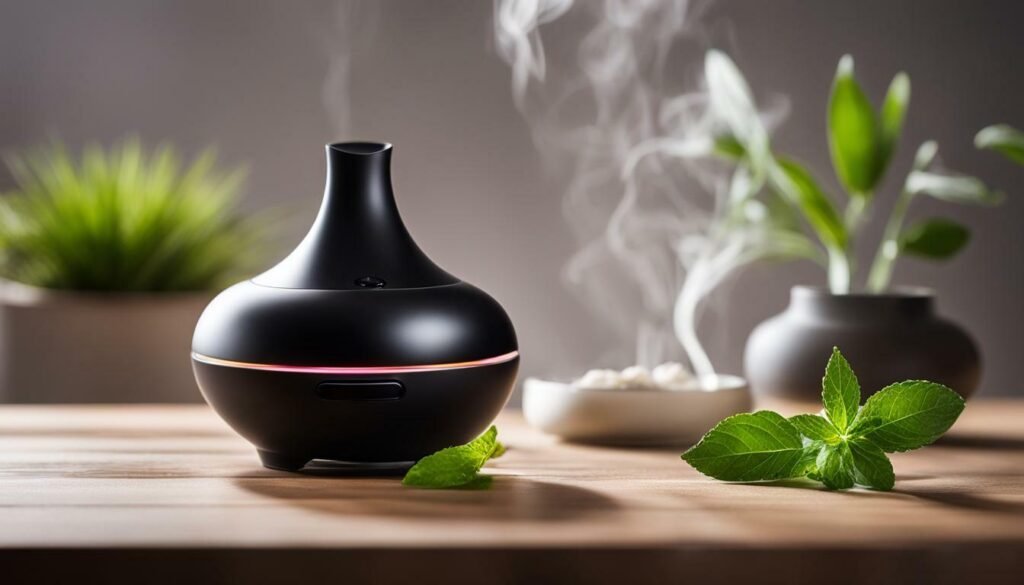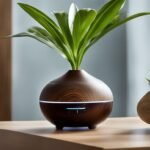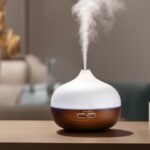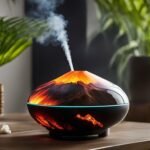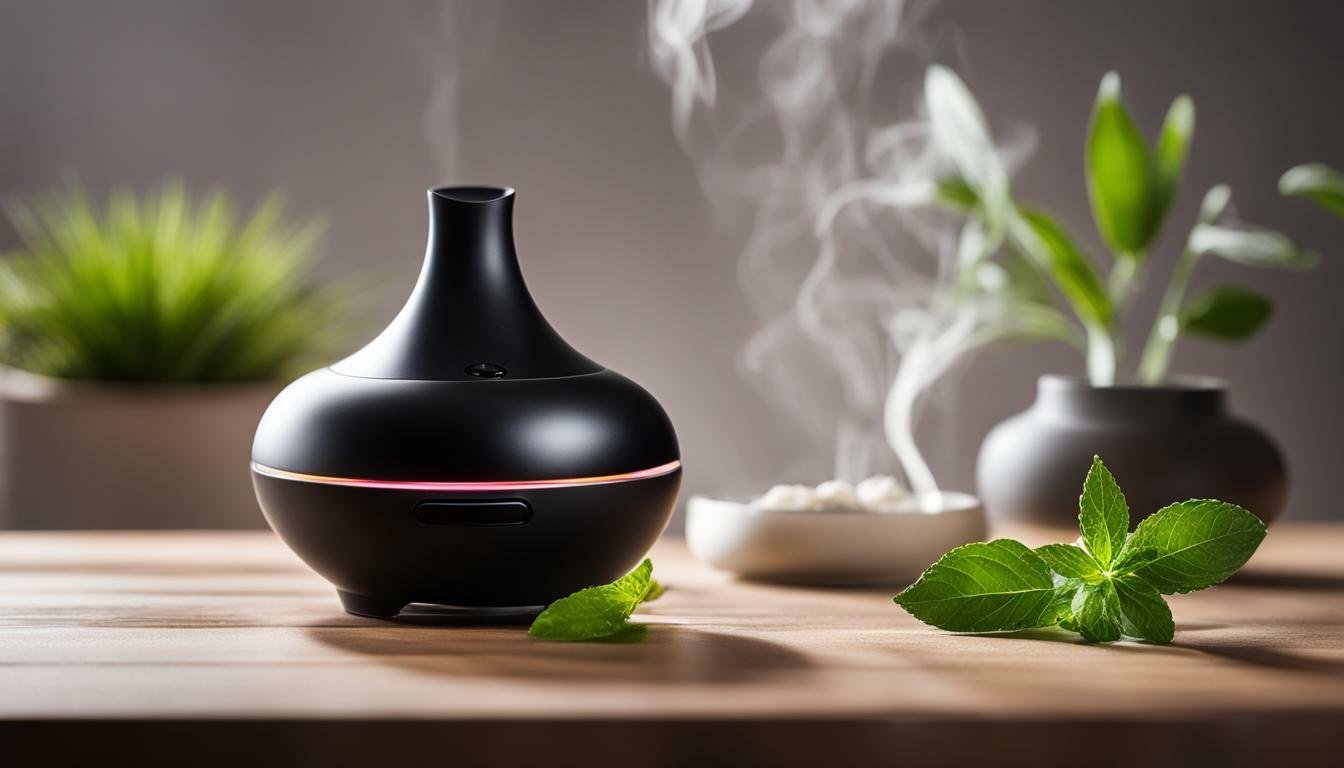
When using an essential oil diffuser, it is crucial to determine the appropriate number of drops of essential oil to achieve the desired results and avoid waste. Optimizing the efficacy of your diffuser begins with finding the right balance of essential oil drops. By considering factors such as the size of your diffuser and the desired scent effect, you can create an aromatic experience that is both effective and enjoyable.
For a 100 ml diffuser, it is generally recommended to start with 3 to 5 drops of essential oil. This serves as a guideline to help you achieve a balanced and pleasant scent. However, remember that personal preference plays an important role in determining the ideal quantity. You may find that you prefer a stronger or milder aroma, and adjusting the number of essential oil drops accordingly can help you achieve the desired intensity.
It is important to take into account the ventilation of the room and the quality of the essential oil you are using. Proper room ventilation ensures that the aroma is evenly distributed and not concentrated in one area. Additionally, using high-quality essential oils can enhance the diffusion efficiency and overall experience.
Using too much essential oil can have negative effects on your health, including overwhelming the nervous system. On the other hand, using too little may result in a weak scent that fails to create the desired ambiance. Experimenting with different quantities and finding the right balance for your preferences is key.
To maintain the efficiency of your diffuser, regular cleaning is recommended. This ensures that the essential oil is diffused effectively without any residue or build-up that could hinder its performance. Clean the diffuser according to the manufacturer’s instructions to prolong its lifespan and optimize its efficacy.
Finally, don’t be afraid to expand your aroma experience by experimenting with different essential oil blends and notes. Mixing oils with complementary scents can create unique and pleasant aromas that suit your preferences and elevate the overall ambiance.
In conclusion, the number of drops of essential oil in a diffuser is a crucial factor in optimizing its efficacy. By considering factors such as diffuser size, personal preference, room ventilation, oil quality, and regular cleaning, you can create a delightful and effective aromatherapy experience.
Factors to Consider When Determining the Quantity
Several factors should be taken into account when determining the number of drops of essential oil to add to your diffuser. These factors include the size of your diffuser and the desired scent effect. A larger diffuser will require more drops of essential oil to achieve a desired scent intensity, while a smaller diffuser may require fewer drops. Similarly, if you prefer a stronger scent, you may need to add more drops, whereas a milder scent would require fewer drops.
Another important consideration is the strength of the essential oil you are using. Some essential oils are more potent than others, so you may need to adjust the quantity accordingly. For example, if you are using a particularly strong oil, you may want to start with fewer drops and then gradually increase the amount until you achieve your desired scent effect.
Lastly, it is crucial to consider the ventilation of the room where the diffuser will be used. A well-ventilated area may require more drops of essential oil to disperse the scent effectively, while a less ventilated space may require fewer drops. It is also important to use high-quality essential oils to ensure the best diffusion efficiency and overall experience.
| Factors to Consider | Recommended Quantity |
|---|---|
| Diffuser Size | 3 to 5 drops for a 100 ml diffuser (as a starting point) |
| Desired Scent Effect | Adjust based on personal preference and strength of the oil |
| Ventilation of the Room | More drops for well-ventilated spaces, fewer drops for less ventilated areas |
| Quality of Essential Oil | Use high-quality oils for optimal diffusion efficiency |
By considering these factors and adjusting the number of drops accordingly, you can create a pleasant and effective aroma experience with your essential oil diffuser.
Recommended Drops for a 100 ml Diffuser
For a 100 ml diffuser, it is typically recommended to start with 3 to 5 drops of essential oil. This range allows for a balanced and effective diffusion of aroma throughout the room. However, the exact number of drops can be adjusted based on personal preference and the strength of the oil being used. Some oils may have a stronger scent and require fewer drops, while others may be more subtle and require slightly more drops to achieve the desired intensity.
When determining the ideal number of drops for your 100 ml diffuser, it’s important to consider the desired scent effect. If you prefer a stronger aroma, you may opt for 4 or 5 drops. On the other hand, if you prefer a more subtle scent, you can start with 3 drops and adjust accordingly. Remember, finding the right balance is key to optimizing the effectiveness of your diffuser.
In addition to personal preference, it is also important to take into account the ventilation of the room and the quality of the essential oil. A well-ventilated room may require fewer drops to achieve the desired scent effect, while a poorly ventilated room may benefit from slightly more drops. Additionally, using high-quality essential oils can enhance the overall experience and may require fewer drops to achieve the desired effect.
| Diffuser Size | Recommended Drops |
|---|---|
| 100 ml | 3-5 drops |
| 200 ml | 6-8 drops |
| 300 ml | 9-11 drops |
Remember, these recommendations are simply starting points. It is always a good idea to experiment with different quantities to find the perfect balance for your personal preferences. By adjusting the number of drops and taking into consideration factors such as room ventilation and essential oil quality, you can create an enjoyable and effective aromatherapy experience with your 100 ml diffuser.
Adjusting the Quantity Based on Personal Preference
While the recommended range of 3 to 5 drops is a good starting point, adjusting the number of drops based on personal preference is key to finding the perfect balance. Some individuals may prefer a subtle and mild scent, while others may enjoy a more intense aroma. By experimenting with different quantities, you can customize your diffuser experience to suit your liking.
It is important to consider the strength of the essential oil when determining the quantity. Some oils are more potent than others, so you may need fewer drops for a stronger fragrance. Conversely, if you have a milder oil, you may need to increase the number of drops to achieve the desired scent intensity.
Another factor to consider is the size of the room. If you have a larger space, you may need to add more drops to ensure the fragrance reaches every corner. On the other hand, if you’re using the diffuser in a small room, fewer drops may be sufficient.
| Diffuser Size | Recommended Drops |
|---|---|
| 100 ml | 3-5 drops |
| 200 ml | 5-8 drops |
| 500 ml | 10-15 drops |
Factors to Consider When Adjusting the Quantity
- Personal preference for scent intensity
- Strength of the essential oil
- Size of the room
By taking these factors into account and experimenting with different quantities, you can create a diffuser experience that is tailored to your unique preferences. Whether you prefer a subtle aroma or a more pronounced scent, adjusting the number of essential oil drops will allow you to achieve the perfect balance. Remember to start with the recommended range and make adjustments as needed. Happy diffusing!
Considering Room Ventilation and Essential Oil Quality
Alongside the quantity of drops, it is essential to consider the ventilation of the room and the quality of the essential oil. These factors can greatly influence the efficiency and overall experience of using an essential oil diffuser.
Proper room ventilation plays a crucial role in the diffusion process. A well-ventilated room allows for better air circulation, ensuring that the scent particles from the essential oil can disperse more effectively. This not only helps to evenly distribute the aroma throughout the space but also optimizes the therapeutic benefits of the oil.
Additionally, the quality of the essential oil used in the diffuser is equally important. Choosing high-quality, pure essential oils ensures that you are getting the full benefit of the plant’s natural properties. Lower-quality oils may contain additives or synthetic fragrances that can diminish the overall efficacy of the diffusion and result in a less satisfying aroma.
Table: Recommended Essential Oil Quality
| Essential Oil Brand | Quality Rating |
|---|---|
| Brand A | Excellent |
| Brand B | Good |
| Brand C | Fair |
| Brand D | Poor |
To ensure maximum diffuser efficiency, it is recommended to choose essential oils from reputable brands known for their quality and purity. This will enhance the overall aromatherapy experience and provide the desired therapeutic benefits.
Carefully considering room ventilation and essential oil quality, in addition to the quantity of drops used, is key to maximizing the effectiveness and enjoyment of using an essential oil diffuser. By paying attention to these factors, you can create an optimal environment for relaxation, focus, and overall well-being.
Potential Risks of Using Too Much or Too Little
Using an excessive amount of essential oil can have adverse effects on your health, while using too little may result in a weak scent. It is important to find the right balance to ensure a safe and enjoyable experience with your diffuser.
When using too much essential oil, it can overload the nervous system and potentially lead to headaches, dizziness, or other health issues. Some essential oils are highly concentrated and can be toxic if used in excess. It is crucial to follow recommended guidelines and not exceed the suggested number of drops for your diffuser size.
On the other hand, using too little essential oil may not provide the desired scent intensity or therapeutic benefits. The aroma may be faint or barely noticeable, reducing the overall effectiveness of the diffuser. It is advisable to start with the recommended number of drops for your diffuser size and make adjustments based on personal preference and the strength of the oil.
To find the right quantity, it is also essential to consider the ventilation of the room. A well-ventilated space may require slightly more drops to achieve the desired scent effect, while a poorly ventilated area may require fewer drops. Additionally, using high-quality essential oils is crucial for optimal diffuser efficiency. Poor-quality oils may not diffuse well, resulting in a weak scent even with the right quantity.
| Risks of Using Too Much | Risks of Using Too Little |
|---|---|
| Overloads the nervous system | Weak or barely noticeable scent |
| Potential health issues | Lack of therapeutic benefits |
| Possible headaches or dizziness | Reduced effectiveness of the diffuser |
To maintain the efficiency of your diffuser, it is recommended to clean it regularly. Built-up residue or oils can affect the diffuser’s performance and the diffusion of essential oils. By keeping your diffuser clean, you can ensure optimal functionality and longevity.
Lastly, don’t be afraid to explore different blends and notes to expand your aroma experience. Experimenting with various combinations of essential oils can create unique and pleasant scents tailored to your preferences. Enjoy the versatility of essential oils and discover the delightful aromas they can bring to your space.
Remember, finding the right quantity of essential oil drops for your diffuser is essential to optimize its efficacy. Take into consideration diffuser size, personal preference, room ventilation, and oil quality to create a well-balanced and enjoyable aromatherapy experience.
| Factors to Consider | Recommended Drops for a 100 ml Diffuser |
|---|---|
| Diffuser size | 3 to 5 drops |
| Personal preference | Adjust based on desired intensity |
| Room ventilation | Consider airflow for optimal scent effect |
| Essential oil quality | Use high-quality oils for best results |
Maintaining Diffuser Efficiency Through Regular Cleaning
To ensure your diffuser works at its best, regular cleaning is crucial for maintaining efficiency. Over time, essential oils can build up inside the diffuser, affecting its performance and the quality of the aroma it disperses. By following a simple cleaning routine, you can keep your diffuser running smoothly and enjoy the full benefits of aromatherapy.
Start by unplugging the diffuser and emptying any remaining water and essential oil from the reservoir. Use a soft, damp cloth to wipe down the inside and outside of the diffuser, removing any residue or oils. Be sure to clean the small crevices and grooves carefully to prevent clogs or buildup. For stubborn residue, a cotton swab dipped in rubbing alcohol can be used to gently scrub the areas.
In addition to regular wiping, it’s recommended to deep clean your diffuser once a month. Fill the reservoir halfway with clean water and add a few drops of white vinegar. Run the diffuser for 5-10 minutes to allow the vinegar solution to clean the internal components. Empty the reservoir and rinse it thoroughly with clean water. Finally, wipe the diffuser dry with a soft cloth before using it again.
| Step | Frequency |
|---|---|
| Wipe down the diffuser | After each use |
| Deep clean with vinegar | Once a month |
By following these simple cleaning steps, you can maintain the efficiency of your diffuser and ensure a consistent and pleasant aroma experience. Regular cleaning not only extends the lifespan of your diffuser but also helps prevent any cross-contamination of scents when using different essential oil blends. So, make cleaning your diffuser a part of your regular routine to enjoy the full benefits of aromatherapy and create a soothing atmosphere in your home or workspace.
Expanding the Aroma Experience with Different Blends and Notes
By exploring different blends and notes, you can create a wide range of unique and pleasant aromas to suit your preferences. As you become more familiar with essential oils, you’ll discover the art of blending, combining different oils to create customized scents that evoke specific moods or enhance specific environments.
An effective way to start experimenting with blends is to understand the different scent profiles of essential oils. Some oils have a floral and sweet aroma, while others are more woody or herbal. By mixing oils with complementary scent profiles, you can create a harmonious blend that is pleasing to the senses.
One approach is to choose a main scent, often referred to as the “base note,” and then add a few drops of a “middle note” and a “top note” to enhance the aroma profile. For example, you might combine a base note of lavender with a middle note of geranium and a top note of bergamot to create a soothing and uplifting blend.
| Base Note | Middle Note | Top Note |
|---|---|---|
| Lavender | Geranium | Bergamot |
Remember, blending essential oils is an art, and there are no strict rules. It’s all about finding combinations that you enjoy and that work well together. Start by experimenting with small amounts and gradually adjust the ratios to find the perfect balance. You may even discover your own signature blend!
With the vast variety of essential oils available, you can create blends for different purposes and moods. For a relaxing evening, try combining lavender with chamomile and ylang-ylang. For an invigorating atmosphere, mix peppermint with eucalyptus and lemon. The possibilities are endless, and the enjoyment of creating your own unique scents is part of the aromatherapy experience.
Conclusion
Determining the appropriate quantity of essential oil drops in your diffuser is essential for maximizing efficacy and creating an enjoyable aromatherapy experience. When using an essential oil diffuser, it is important to use the right amount of essential oil to avoid overpowering scents or underutilizing the therapeutic benefits.
The recommended amount of essential oil drops depends on the size of the diffuser and the desired scent effect. For a 100 ml diffuser, 3 to 5 drops of essential oil are generally recommended as a starting point. However, this amount can be adjusted based on personal preference and the strength of the oil.
In addition to diffuser size and personal preference, it is also crucial to consider the ventilation of the room and the quality of the essential oil. Adequate room ventilation allows for proper diffusion, while high-quality essential oils ensure a more authentic and potent scent experience.
Using too much essential oil in a diffuser can overload the nervous system and potentially cause health issues. On the other hand, using too little essential oil may result in a weak scent, diminishing the desired aromatherapy effects. Therefore, finding the right balance is key.
To maintain the efficiency of your diffuser and ensure optimal performance, regular cleaning is important. Cleaning the diffuser removes any buildup that may affect the diffusion process, allowing for consistent and effective scent release.
Lastly, don’t be afraid to experiment with different blends and notes to create unique and pleasant aromas. The versatility of essential oils allows for endless possibilities, so have fun exploring and finding your favorite combinations.
Remember, by finding the right quantity of essential oil drops for your diffuser, considering personal preferences, room ventilation, and essential oil quality, you can enjoy the full benefits of aromatherapy and create a soothing environment that enhances your well-being.
FAQ
How many drops of essential oil should I use in my diffuser?
The recommended amount of essential oil drops depends on the size of the diffuser and the desired scent effect. For a 100 ml diffuser, 3 to 5 drops of essential oil are recommended as a starting point.
Can I adjust the number of drops based on personal preference?
Yes, absolutely! The quantity of essential oil drops can be adjusted based on your personal preference and the strength of the oil. Feel free to experiment to find your desired scent intensity and therapeutic benefits.
Should I consider room ventilation and the quality of the essential oil?
It is important to consider room ventilation and the quality of the essential oil when determining the number of drops to use. These factors can impact the diffusion efficiency and overall experience. Ensure proper airflow in the room and use high-quality essential oils for the best results.
What are the potential risks of using too much or too little essential oil?
Using too much essential oil can overload the nervous system and cause health issues. On the other hand, using too little may result in a weak scent. It is crucial to find the right balance to avoid these potential risks and ensure a pleasant aromatherapy experience.
How can I maintain the efficiency of my diffuser?
Regularly cleaning the diffuser is essential to maintain its efficiency. Follow the manufacturer’s instructions on cleaning and make it a part of your routine. This will help ensure optimal diffusion performance and extend the lifespan of your diffuser.
Can I create unique scents by experimenting with different blends and notes?
Absolutely! Experimenting with different essential oil blends and notes can create unique and pleasant aromas. Get creative and try combining different oils to discover your own signature scent and enhance your overall aroma experience.

